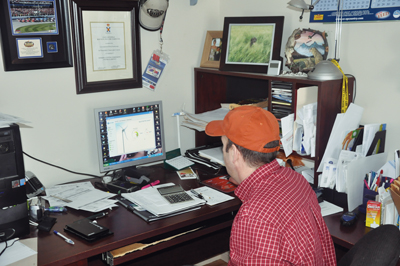
Glen Jennings is modest about being called a “pioneer” in the Nova Scotia poultry industry.
Glen Jennings is modest about being called a “pioneer” in the Nova Scotia poultry industry.
 |
|
 |
|
| Glen Jennings, pictured here with his wife Lisa, daughter Amy and son Blake, was the first poultry farmer in Nova Scotia to install wind turbines to power egg production. | |
 |
|
| Jennings is able to watch the performance of the turbines on his home computer. Advertisement
|
The fourth-generation egg farmer wanted to be more efficient, and set his sights on reducing the costs associated with his operation’s annual 110,000 kilowatt usage.
He didn’t have to look too far.
His operation, Bayview Poultry Farms, composed 4of two layer barns each housing 6,000 layers, a pullet barn and egg grading facility, is located in a very windy site right next to Cobequid Bay in Masstown, N.S., providing the perfect opportunity for Jennings to take advantage of an ample renewable resource and harvest the wind.
Partnering with Second Source Power, Jennings became one of the first farmers in the province to install wind turbines, and he was the first to install the Skystream 2.4-kilowatt model turbine. Three turbines were erected in the summer of 2007 and became operational in August of that year.
At peak performance, each turbine can generate up to 2.4 kilowatts per hour, and Jennings says that the combined daily average is 45 kilowatts per day. This is enough to cover 100 per cent of the electricity needed to power Bayview’s egg production. Initially, Jennings thought that the turbines would cover 75 per cent of the entire operation, but he says that when the cooling and grading facilities are factored in, on a farm whole, the turbines cover 50 per cent of total energy demand.
“I still get excited when I see that they’re full open,” says Jennings, referring to the computer program in his office that lets him know on the screen how much energy the turbines are producing. Jennings has a contract with Nova Scotia Power for the life of the turbines, and when the turbines produce more energy than what Bayview needs, he gets a one-for-one credit, meaning that excess energy is credited on the grid and can be used when the turbines aren’t meeting energy demand. However, the one-for-one credits don’t remain indefinitely – they have to be used within a year. “At the end of the year if I have credits left, I lose them,” he says.
Ultimately, Jennings would like to eliminate his electric bill entirely, and plans to install several more turbines or upgrade his current turbines.
But Jennings says he soon realized that harvesting wind power isn’t just about saving money, it’s also about being environmentally sustainable. “I can look my children and customers in the eye and let them know that I care about producing an environmentally friendly product,” he says. Consumers, he says, can also feel as though they are “doing their part” for the environment by buying “green” eggs.
The eggs also provide the opportunity for Bayview to support the local food movement and the “Atlantic First” commitment of Co-op Atlantic, the grocery retail chain and the member stores that sell a portion of the 11,000 eggs produced daily in Nova Scotia and New Brunswick.
Jennings says he gets a premium from Co-op Atlantic and also from Second Source by featuring the company and a wind turbine directly on the cartons, something he doesn’t know if anyone has ever done before.
Not afraid of a challenge, Jennings says that although “public speaking used to be my enemy,” he took on the role of chair of the Nova Scotia Egg Producers in 2002. He says he had to get over his nervousness quickly, as several months after being elected his board was the host of the annual summer meeting of the Egg Farmers of Canada.
He says he took on the role because “we’re all in charge of our own future,” and he wanted to be on top of things so that he could have a bigger role in his. He enjoys the fact that new challenges and changes happen every year, and says that in the last few years trade has been the focus of the board’s energy but “welfare has been right along there with it.”
Although Jennings took over the farm from his parents, Cecil and Doris, in the early 1990s, he says with a laugh that his retired father “works almost every day.” He likes the manageable size of the farm, as it gives him family time with wife Lisa, son Blake and daughter Amy.
According to Jennings, Blake is a true farm boy and has caught the “farming bug” and enjoys taking on responsibility, including running the family’s large u-pick pumpkin business in the fall. “I pray that things (supply management) stay together so that he can take over from me one day,” says Jennings.
Jenning’s wind power initiative has caught on with other farmers in the province, with 10 turbines utilizing the renewable resource in the immediate area. He supplies a local farm market and says that people from Halifax drive up to buy “green eggs and buns.”
Print this page